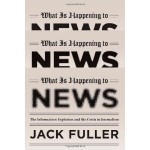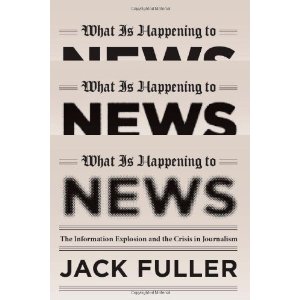Back in the summer of 2008, the cover of The Atlantic asked us, quite pointedly: “Is Google Making Us Stoopid?” Inside, Nicholas Carr provided an overview of “what the Internet is doing to our brains”; from the vantage of June 2010, I would say that an Internet meme had been born. At least, as I prepare for a panel at Sunday’s Printers Row Lit Fest in Chicago with Carr, Jack Fuller, and Tom Bissell, it sure feels like a meme – and you can find out whether you agree by watching the panel on CSPAN2’s BookTV, live at 1 p.m. Central.
The question and its answers actually didn’t show up everywhere all at once. Exactly one year later, The Atlantic included coverlines that asked, “Is Google Actually Making Us Smarter?” Inside, Jamais Cascio made the case for “augmented cognition”; if a battle had not been joined, at least another voice had joined the discussion.
 About the same time, I first heard from Fuller, my friend and ex-Tribune Co. colleague, about the book he had been working on, an exploration of what neuroscience can tell us about why people respond to today’s media the way they do. As I wrote here last year, Jack allowed me to read the book in typescript, and I since have had him share his ideas with two groups of Medill graduate students. His book, What Is Happening to News: The Information Explosion and the Crisis in Journalism, was published in June. Feel free to link off to Amazon and buy a copy; while you wait for it to arrive, here is a link to an excerpt in the Spring 2010 issue of Dædalus, the journal of the American Academy of Arts & Sciences. (I recommend that whole issue highly too; called “On the Future of News,” it was edited by my Medill colleague Loren Ghiglione.)
About the same time, I first heard from Fuller, my friend and ex-Tribune Co. colleague, about the book he had been working on, an exploration of what neuroscience can tell us about why people respond to today’s media the way they do. As I wrote here last year, Jack allowed me to read the book in typescript, and I since have had him share his ideas with two groups of Medill graduate students. His book, What Is Happening to News: The Information Explosion and the Crisis in Journalism, was published in June. Feel free to link off to Amazon and buy a copy; while you wait for it to arrive, here is a link to an excerpt in the Spring 2010 issue of Dædalus, the journal of the American Academy of Arts & Sciences. (I recommend that whole issue highly too; called “On the Future of News,” it was edited by my Medill colleague Loren Ghiglione.)
And then the deluge.
A book had grown out of Carr’s Atlantic piece: The Shallows: What the Internet Is Doing to Our Brains was being published in June, just in time for Printers Row. And when I picked up The Wall Street Journal last Saturday (June 5), the “Saturday essay” on the front page of Weekend Journal was given over to a point-counterpoint between Carr and the estimable Clay Shirky, who, lo and behold, has a new book too: Cognitive Surplus: Creativity and Generosity in a Connected Age.
And there was still more: On Monday, Page One of the New York Times….plus two entire open jump pages…addressed one slice of these issues with “Hooked on Gadgets, and Paying a Mental Price.” “Your Brain on Computers,” said the logo that ran with the story, “The Information Addiction.” No real point-counterpoint here: “paying a price” was the focus, complete with a box of warning signs to tell you if you are “too absorbed in technology”: “Have you ever lied about or tried to hide how long you’ve been online?” (Not me, but maybe the mother in FoxTrot…..)
So there’s plenty to talk about Sunday, including “Extra Lives: Why Video Games Matter,” by Bissell. Does spending 80 hours playing a particular console video game fit into that box of “too absorbed”? (“These days,” he writes in Chapter Nine, ” I play video games in the morning, play video games in the afternoon, and spend my evenings playing video games. . . .I woke up this morning at 8 a.m. fully intending to write this chapter. Instead, I played Left 4 Dead until 5 p.m.”
Shirky, who won’t be in Chicago Sunday, with his “cognitive surplus” holds that diverting even a tiny fraction of consumers’ attention away from content consumption, largely via television, to participation and creation “can create enormous positive effects.” Carr, who will be there, worries (among other things) about the decline in diversity of ideas and opinion that flows from too much choice. And Fuller explains from his research why neurobiology dictates that the way we are wired both makes us focus on the sensational and fatally disrupts the “Standard Professional Model” of journalism.
We should have an interesting time, so come on down. Or find us on BookTV, where the panel will be followed by a call-in segment.

